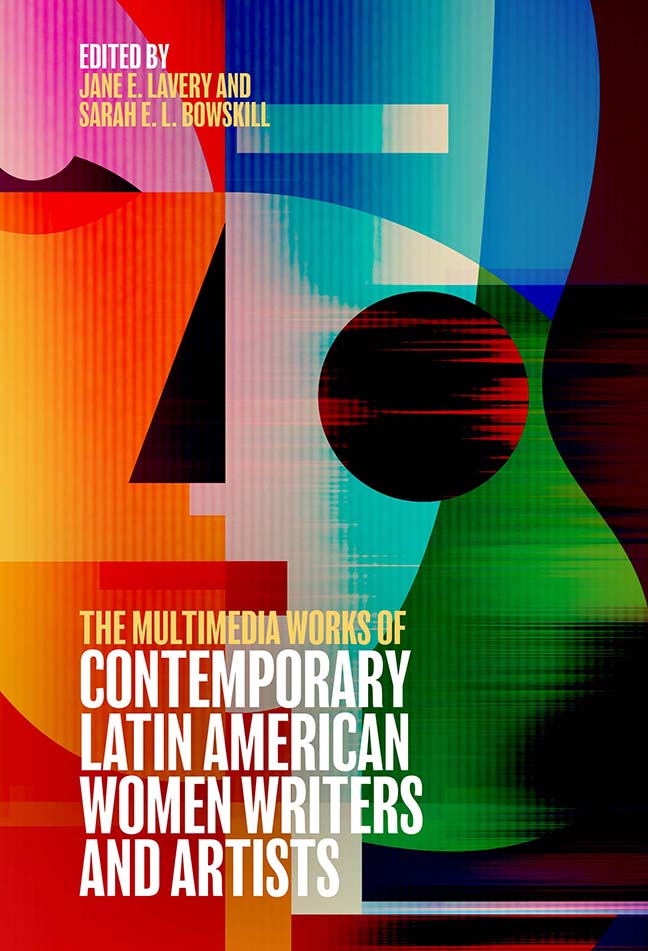Book contents
- Frontmatter
- Contents
- List of Illustrations
- List of Contributors
- Acknowledgments
- Introduction: A Crosscurrent of Contemporary Latin American Women Multimedia Writers and Artists
- 1 The Transliterary: The Novel and Other Multimedia Horizons Beyond (and Close to) the Textual
- 2 Commentary on Fe/males: Sieges of the Post Human (Transmedia Installation)
- 3 An Anthropophagic Ch’ixi Poetics
- 4 My Relationship with Artistic Creation Began with Words
- 5 Imagetext
- 6 Voices/Bodies
- 7 Redefining Meaning: The Interweaving of the Visual and Poetic
- 8 The Territory Is Home
- 9 Reflections on a Multimedia Practice
- 10 Digital Weaving
- 11 Eli Neira, Regina José Galindo, and Ana Clavel: “Polluting” Corporealities and Intermedial/Transliterary Crossings
- 12 The Digital Condition: Subjectivity and Aesthetics in “Fe/males” by Eugenia Prado Bassi
- 13 The Transmedia, Post-Medium, Postnational, and Nomadic Projects of Pilar Acevedo, Rocío Cerón, and Mónica Nepote
- 14 The Art of the Hack: Poets Carla Faesler and Mónica Nepote and Booktuber Fátima Orozco
- 15 The Places of Pain: Intermedial Mode and Meaning in Via Corporis by Pura López Colomé and Geografía del dolor by Mónica González
- 16 Words, Memory, and Space in Intermedial Works by Gabriela Golder and Mariela Yeregui
- 17 Fungibility and the Intermedial Poem: Ana María Uribe, Belén Gache, and Karen Villeda
- 18 Hypertext and Biculturality in Two Autobiographical Hypermedia Works by Latina Artists Lucia Grossberger Morales and Jacalyn Lopez Garcia
- 19 Dialogues Across Media: The Creation of (New?) Hybrid Genres by Belén Gache and Marina Zerbarini
- Bibliography
- Index
- Tamesis
3 - An Anthropophagic Ch’ixi Poetics
Published online by Cambridge University Press: 17 December 2023
- Frontmatter
- Contents
- List of Illustrations
- List of Contributors
- Acknowledgments
- Introduction: A Crosscurrent of Contemporary Latin American Women Multimedia Writers and Artists
- 1 The Transliterary: The Novel and Other Multimedia Horizons Beyond (and Close to) the Textual
- 2 Commentary on Fe/males: Sieges of the Post Human (Transmedia Installation)
- 3 An Anthropophagic Ch’ixi Poetics
- 4 My Relationship with Artistic Creation Began with Words
- 5 Imagetext
- 6 Voices/Bodies
- 7 Redefining Meaning: The Interweaving of the Visual and Poetic
- 8 The Territory Is Home
- 9 Reflections on a Multimedia Practice
- 10 Digital Weaving
- 11 Eli Neira, Regina José Galindo, and Ana Clavel: “Polluting” Corporealities and Intermedial/Transliterary Crossings
- 12 The Digital Condition: Subjectivity and Aesthetics in “Fe/males” by Eugenia Prado Bassi
- 13 The Transmedia, Post-Medium, Postnational, and Nomadic Projects of Pilar Acevedo, Rocío Cerón, and Mónica Nepote
- 14 The Art of the Hack: Poets Carla Faesler and Mónica Nepote and Booktuber Fátima Orozco
- 15 The Places of Pain: Intermedial Mode and Meaning in Via Corporis by Pura López Colomé and Geografía del dolor by Mónica González
- 16 Words, Memory, and Space in Intermedial Works by Gabriela Golder and Mariela Yeregui
- 17 Fungibility and the Intermedial Poem: Ana María Uribe, Belén Gache, and Karen Villeda
- 18 Hypertext and Biculturality in Two Autobiographical Hypermedia Works by Latina Artists Lucia Grossberger Morales and Jacalyn Lopez Garcia
- 19 Dialogues Across Media: The Creation of (New?) Hybrid Genres by Belén Gache and Marina Zerbarini
- Bibliography
- Index
- Tamesis
Summary
My work is an open question concerning identity. What does it mean to be a woman, neither heterosexual nor homosexual, neither white nor indigenous, neither rich nor poor, with no children, a feminist, a writer, performance artist, ecologist, indigenist pro-indigenous and pro-developing world, living and working in Latin America. I’m interested in untangling the dark side of that history: my history as a daughter of the military coup in Chile, born in that fateful year of 1973, and the history of Chile as part of the history of violence of this century and of this world.
My work is a sort of travel blog log for a body – a territory colonized by ideologies, religions, failed and contradictory political practices, with an ancestral and rebellious memory which refuses to be blotted out. In this journey, it is art and the dialogue between disciplines that has been the best tool for disentangling, understanding, and decolonizing this body, like a minuscule work of personal archaeology.
At the formal level, my work is composed of layers and layers of knowledge and practices that at some moment have come to me, reached me, through channels that are as diverse as they are apocryphal. Like a hungry anthropophagic animal, in the style of Oswald de Andrade, everything nourishes me, everything is useful to me and can be turned into a work of art. The result has been the construction of a Ch’ixi or “sullied” mestizo identity, a compendium of impure attributes and hybrid techniques. Nevertheless, I recognize in poetry an impulse to put everything in order. Like an axis or a vertebral column, the desire for poiesis is the driving force for my work.
Outside the academic world and outside the market, as an artist I’ve had to find my own way without clear direction. This path has been intuitive, autonomous, and political. A productive state of being which has allowed me an inordinate freedom to transform the sense of lack into a creative resource.
I am interested in art as construction of a utopian imaginary. A social experiment that leads me to new ways of relating to the world. I am someone who believes that change has to be cultural or it will not be change at all, and I am also someone who believes that art is the last refuge of humanity in an increasingly dehumanized world.
- Type
- Chapter
- Information
- Publisher: Boydell & BrewerPrint publication year: 2023

